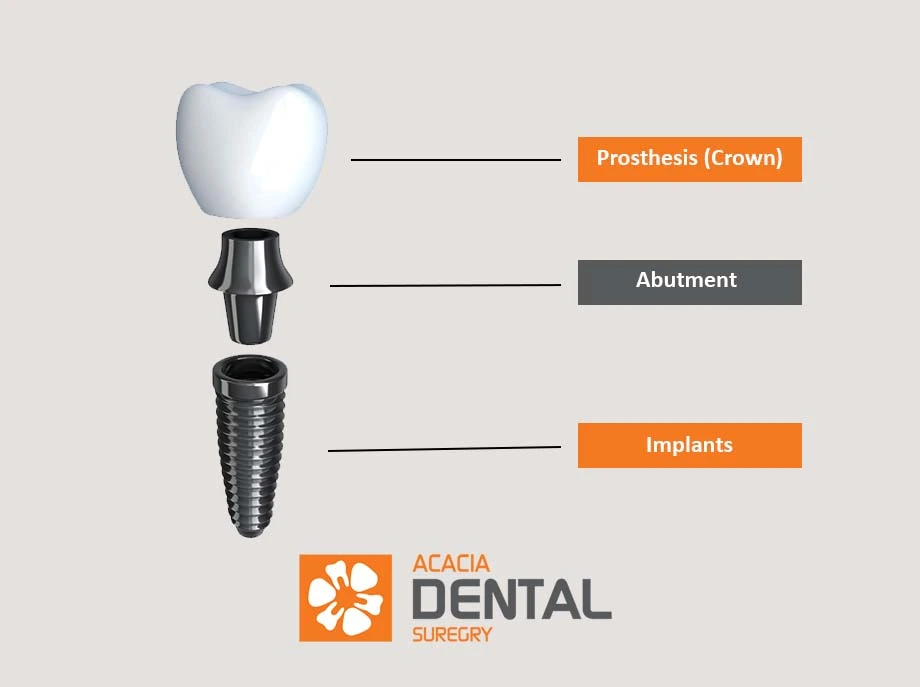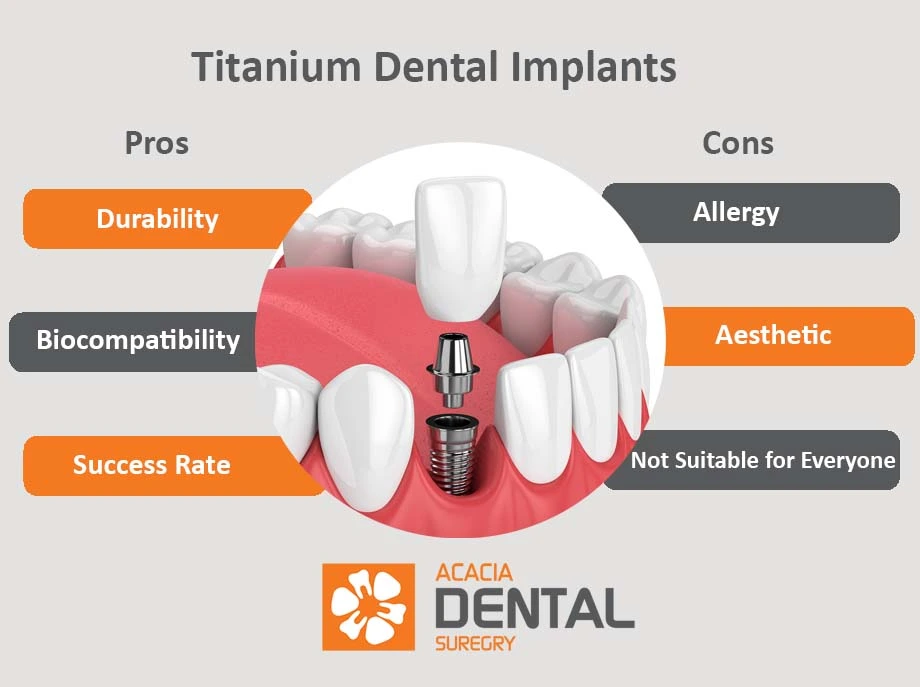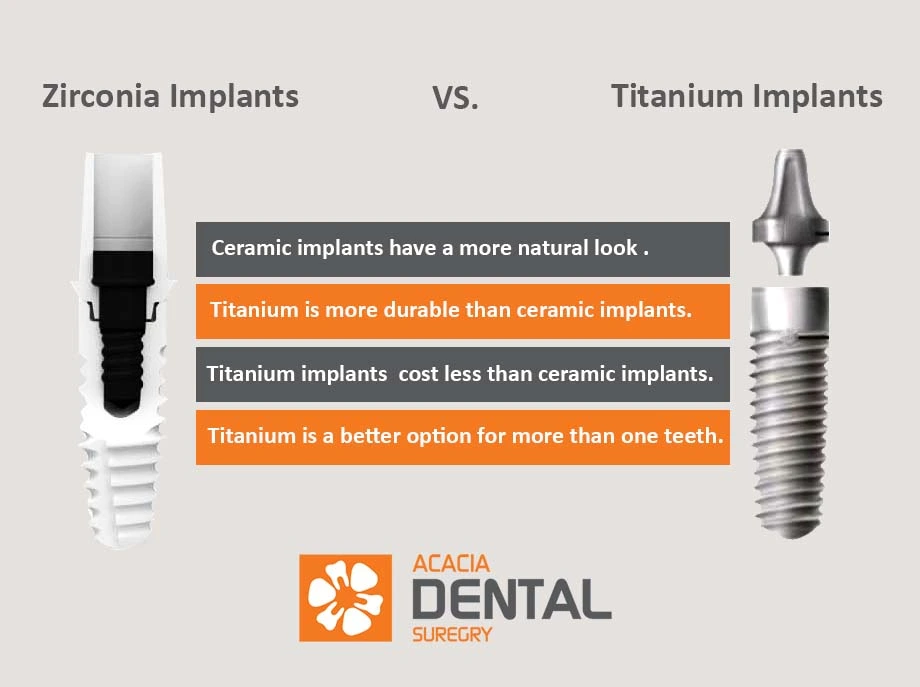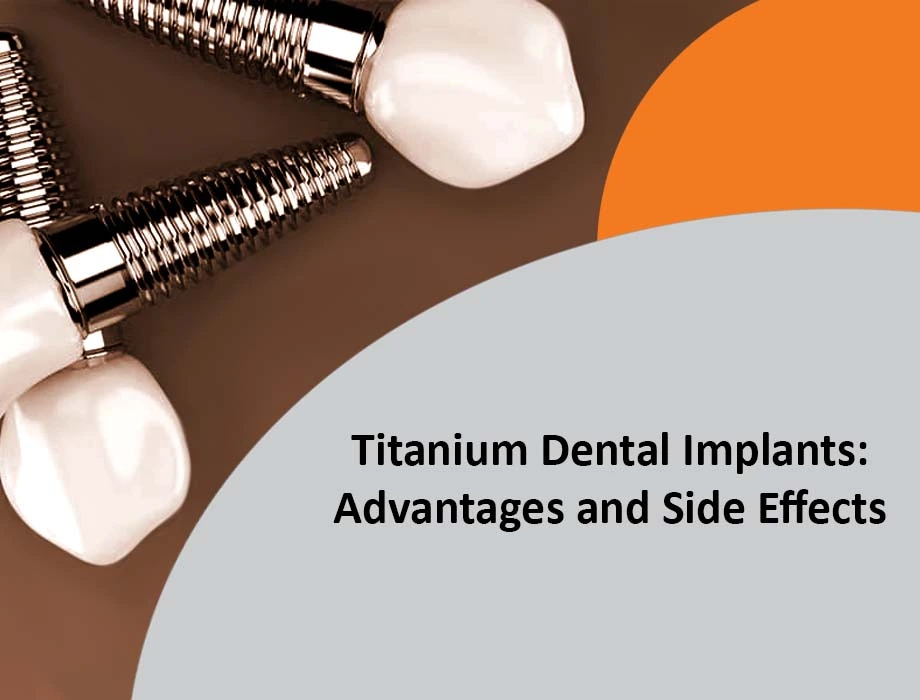When it comes to dental implants, different materials are used, each has its own advantages and disadvantages. One of the most popular materials for this procedure is titanium. Although titanium dental implants give you the same result as other implants, some differences may make it a better option for some patients. So, let’s learn more about titanium implants.
What Are Ttitanium Dental Implants?
To define titanium implants, we should first describe each part of a dental implant. Each implants include three parts:
- The implant: The part inserted into the jawbone acts as an anchor for the artificial tooth. When we mention the implant, we usually talk about this part, which is the most critical part of this dental procedure.
- The abutment: The part that connects the implant to the prosthesis. The abutment is usually made of titanium, ceramic, or zirconia. It has a cylindrical shape with a hexagonal or octagonal base.
- The prosthesis: The part that forms the visible part of the missing tooth. The prosthesis can be a crown, a bridge, or a denture, depending on the number and location of the missing teeth.

Therefore, Titanium dental implants are artificial tooth roots made of titanium, a biocompatible metal that can fuse with the jawbone. Like other types of implants, titanium implants also replace missing teeth and support crowns, bridges, or dentures.
However, you might wonder why you should choose this type of implant. To answer this question, check out the pros and cons of titanium implants.
Pros of Titanium Implants
Some of the advantages of titanium dental are:
Being Highly Resistant
Titanium is a durable and stable material. With proper care and oral hygiene maintenance, it can last for decades or even for a lifetime. Meanwhile, the lifespan of a titanium implant is almost 25 years.
Biocompatibility
For some people, titanium might seem an uncommon material to screw into the jawbone. But titanium alloy is highly compatible with the human body as it can easily bond with the surrounding tissue. Accordingly, it is a safe and effective material to utilize.
Success Rate
According to a study done by Pubmed, the success rate of titanium implants is %97. It means almost all the patients who have used this implant were completely satisfied with the result.
Cons of Titanium Implants
Like any other materials, titanium dental implants have some disadvantages too, including:
Allergy
Allergic reactions are the most common side effects of titanium dental implants. Although rare, some people might have metal sensitivity and reactions to titanium, which cause discomfort and may lead to implant failure after a while.
Not Suitable for Everyone
Despite all the benefits titanium dental implants have, it might not be the perfect option for everyone. The patient must have adequate bone density and healthy gums to support the titanium. However, the oral surgeon examines the patient’s oral health and bone quality before the dental implant procedure to discover which material is the best option.
Cosmetics
Although titanium implants look perfect, they are not as natural as ceramic implants. Additionally, since titanium has a dark color, it might be visible for patients who have receding gum lines.

Note: like any other type of dental implant, if you don’t care for and maintain your oral health, it is possible to face post-implantitis after a while. Therefore, it is essential to follow your dental routine like before.
Titanium Dental Implants Vs. Zirconia Implants
The other type of dental implant is the zirconia implant, the same as ceramic implants. Unlike titanium, which is metal, zirconia is made of crystal material. Therefore, a zirconia implant is usually known as a metal-free implant. Let’s see what are their differences:
- Ceramic implants have a more natural look than titanium implants. Since zirconia is a crystal material, it resembles a tooth more than the metallic look of titanium.
- On the other hand, titanium is more durable than ceramic implants. If you manage your oral health, titanium can last more than 25 years, and the lifespan of ceramic implants is up to 15 years.
- Titanium material is more common, making it cost less than ceramic implants.
- Titanium can work better than zirconia if more than one tooth is missed.

However, apart from their differences, choosing one over the other depends on the patient’s needs and health condition. It is better to consult your oral surgeon about the best option based on your condition.
Bottom Line
Titanium dental implants are a highly effective and reliable solution for those seeking to restore their natural smile. They provide a long-lasting and stable foundation for replacement teeth, allowing patients to confidently eat, speak, and smile. While the initial implant cost may be higher than other options, the long-term benefits and improved quality of life make it a worthwhile investment. However, the cost of titanium implants is lower than other types.
Anyhow, if you are considering dental implants, talk to your dentist about the benefits of titanium implants and how they can help you regain your oral health and confidence. Our experienced dentists in Acacia Dental are ready to consult and perform dental implants for people in Coolalinga, Darwin, and Humpty Doo. So, don’t hesitate to contact us for more information.
